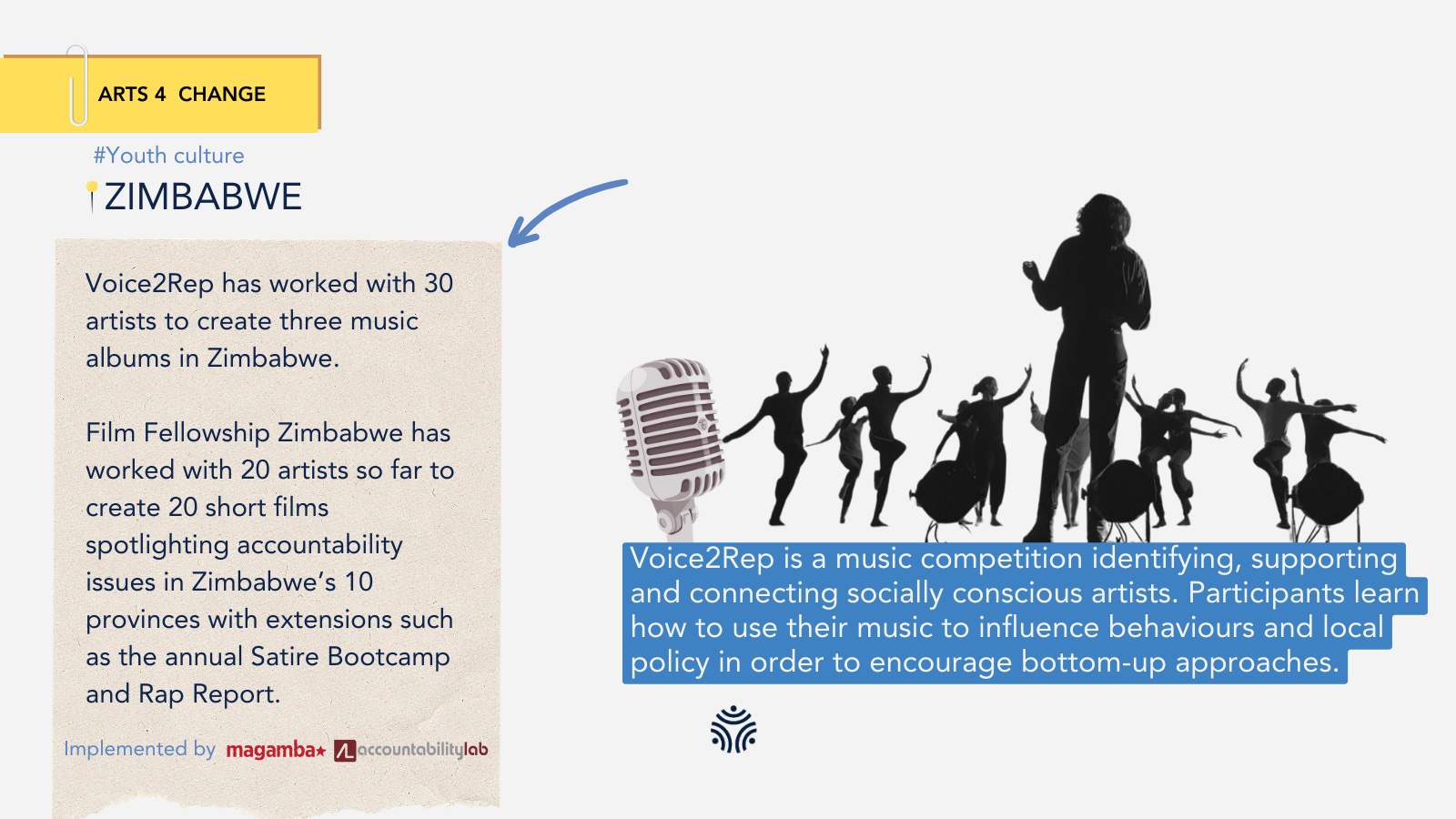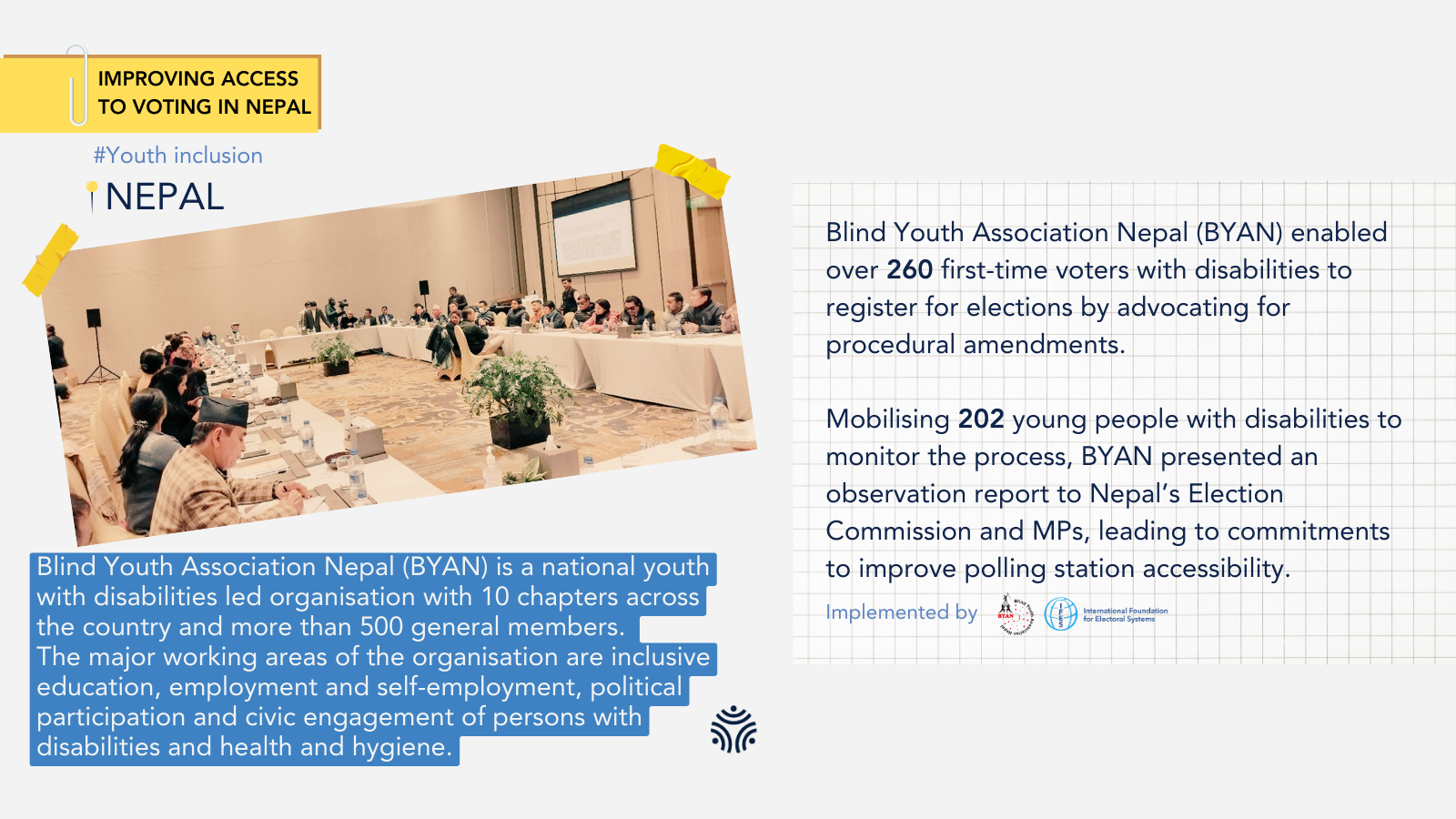
Ahead of the third edition of the Summit for Democracy, the Youth Democracy Cohort (YDC) relaunches the Menu of Possible Commitments to garner momentum for greater improvement of youth political participation rights. In the next weeks, join us in celebrating how youth-led initiatives can benefit our democracies as we bring commitments to life through a series of articles and social media posts.

About the Author
Kessy Martine EKOMO-SOIGNET has over 13 years of experience in the field of development and research on peace and security issues and more specifically on youth and civil society in the Central African Republic.
She is a community leader and founder of the national NGO URU (founded in 2014) working for effective youth participation in the peace and recovery process in the Central African Republic. In 2021, she created the consulting firm Peace and Development Watch Central African Republic specialising in project monitoring and evaluation. She was appointed Vice-President of the Central African Patronat in 2023.
Freedom of expression is the essence of civic engagement and activism around the world. It is on this basis that active and healthy participation in democracy is based. However, when analysed through the prism of youth participation, it is evident that this population faces prejudices and socio-cultural burdens that severely limit the effective consideration of youth voices and especially their protection in civic space.
Youth, throughout the world, is synonymous with strength and hope, as well as ardour and immaturity. Negative perceptions or conceptualizations of youth generally lead to a reductive adultism in which it is not acknowledged that young people can also be critical thinkers, strong in proposals, capable of making informed choices and expressing strong opinions..
Democracy’s decline and its impact on freedom of expression
Many countries around the world are facing a strong democratic crisis. We are witnessing an increasing desire from certain groups to monopolise reflections and censor people who think differently.
In countries with a certain democratic stability, we see young people speaking out and taking a stand on climate and democracy issues in an environment that guarantees them a minimum of protection and freedom of expression.
I am originally from the Central African Republic. Unfortunately, my country is characterised by a drastic reduction of civic space with adultism that takes on a manipulative, corrupting political character, marked by violence to silence young people who dare to express themselves or question the status quo. It is not just a question of states attacking young people, but of other young people who, out of ideologies, attack their peers, as we can see in Iran, where denunciation among young people has a drastic impact on freedom of expression.
Thinking about the role of young people in relation to freedom of expression means taking into account their own realities. The forms of oppression vary and the modes of action vary from country to country, but the fight to protect the freedom of expression of young people remains a shared struggle.
The 2015 vote on the United Nations Security Council Resolution 2250 laid the groundwork for putting the role and contribution of young people back on the international agenda. The Youth, Peace and Security agenda served as a reminder to the world that young people have always been agents of change. The resolution led decision-makers to open up their official spaces to young people so that they could express themselves freely.
In the wake of Resolution 2250, the study “The Missing Peace” commissioned by the United Nations Security Council highlighted the fact that young people are not afraid to express themselves and that even if they do not have access to the decision-making table, they know how to use their creativity to make themselves heard.
Modern forms of political activism
Indeed, social media has made it possible to highlight that youth is plural in its demands, its opinions, and its modes of expression. Art, music, and poetry became powerful tools, carrying the voice of youth. Decision-makers are no longer directly targeted, but there is a desire to mobilise and rally in favour of amplifying messages. The challenges of young people in the Democratic Republic of Congo are shared by young people in the Central African Republic and Cameroon, for example. This outpouring of solidarity shared behind the screen of anonymity offered by the internet is just one example of how young people can amplify their voices.
Similarly, we note the emergence of young people who decide to get involved in politics both as candidates and as active volunteers during major electoral events. The latter generally face prejudices and cultural burdens that call into question the ability of young people to make an impact. They also face what we call the “cute effect” which is characterised by the symbolic recognition of a young person in spaces of public expression without consideration for his or her words.
To support young people’s freedom of expression, it is essential to understand their different qualities and to identify opportunities that will enable them to play a full role as citizens.The concrete actions proposed in the Menu of Possible Commitments are achievable with the support of all. Young people around the world are no longer taking a wait-and-see approach but are active. However, some doors are only open if a critical mass of actors comes together to open them. Young people need the support of political decision-makers, the private sector, and international institutions to continue to implement this agenda on which the future of our democracies rests.
Success Stories on prioritising youth voices in governance
Commitment #16 – Activism through art in Zimbabwe
“Helping young advocates, artists, journalists and bloggers enjoy peaceful freedom of expression by strengthening the legal frameworks and enabling safe civic spaces.”
Menu of Possible Commitments

Led by Magamba and Accountability Lab, the Arts4Change programme promotes and supports the use of art to conduct advocacy around crucial political issues. The programme is divided into the Voice2Rep ZW project which has created three music albums and the Film Fellowship ZW which created 20 short films spotlighting accountability issues. Both initiatives were implemented in Zimbabwe, as participants were supported in using their art to influence critical thinking and local policies. The programme sought to bring a positive perspective to political issues and was successful in attracting stakeholders who are often left out of traditional activism and social movements.
The outcomes are impressive. One film was nominated for awards at multiple film festivals while one of the supported musical artists has earned a grant to support their career. As artistic activism remains largely underfunded around the world, the Arts4Change has received USAID support for three years, potentially enabling alumni of the project to return and lead future activities. Governments must ensure that their legal frameworks are appropriate to help young artists to enjoy their freedom of expression and civic space.
Commitment #17 – Improving access to voting in Nepal
“Promoting youth access to voting by facilitating access to citizen ID and the inclusive registration of voters via digitised civil and voter registries, and systematising the link between the two registries.”
Menu of Possible Commitments

In 2022, with the support from the International Federation of Electoral Systems (IFES), the Blind Youth Association Nepal (BYAN) carried out an inclusive programme to register first voters with disabilities ahead of the country’s local, provincial, and federal elections. In previous electoral processes, citizens needed to travel to the registration desks of their permanent address’ district to be registered to vote. BYAN lobbied heavily to Nepal’s Election Commission to amend procedural rules to enable people with disabilities to register from their temporary addresses. The program enabled more than 260 first time voters with disabilities to register by making it more accessible and cheaper. During the election, BYAN mobilised a total 202 young people with disabilities to monitor and observe the process from the accessibility point of view. An election observation report was presented to members of Nepal’s Election Commission and members of the federal parliament. The Election Commission and MPs have pledged to improve accessibility of polling stations for young people with disabilities.
Join the campaign
These are only a handful of examples of the positive impact that greater youth freedom of expression can have on democratic governance. Join the YDC in calling for youth to be supported in expressing their views by sharing the commitment that resonates with the issues in your community, and by showcasing your own success stories with the hashtag #YouthInAction.